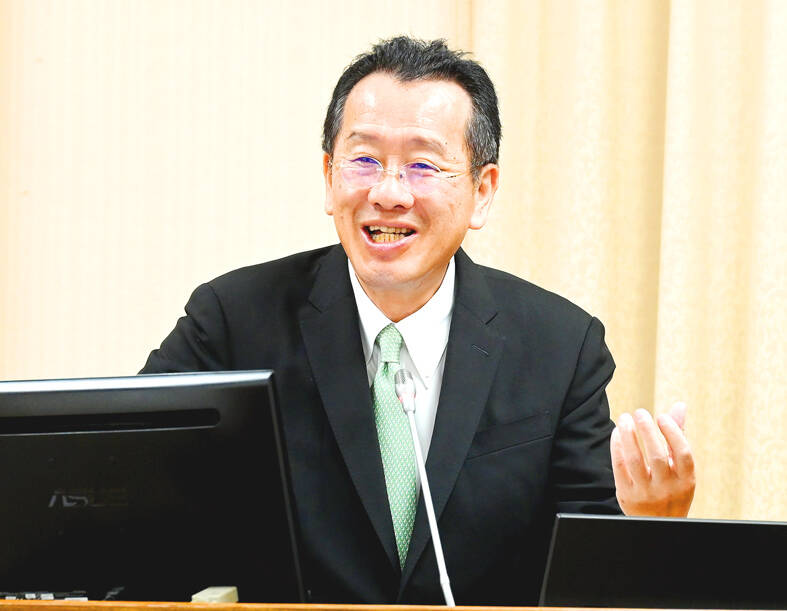Some military ammunition and supply stockpiles would have to be kept in inhabited areas for Taiwan to be defended effectively, Minister of National Defense Wellington Koo (顧立雄) told lawmakers at a meeting of the Foreign Affairs and National Defense Committee at the legislature in Taipei yesterday.
Top defense officials also briefed legislators on the Ministry of National Defense’s (MND) internal probe into the use of blacklisted Chinese-made dashcams in military vehicles and an effort to develop a new service rifle chambered in 6.8mm.
Asked about reports alleging that the military plans to store shells in temples in wartime, Koo said that the armed forces expect a defensive campaign in conditions that preclude a strict separation of front lines and rear areas.

Photo: Wang Yi-sung, Taipei Times
Dispersion of military supply depots — including ammunition stores — is essential in defensive warfare, he said, adding that the armed forces take pains to ensure their practices comply with international and domestic laws.
Lieutenant General Lu Chien-chung (盧建中), deputy chief of the general staff for communication, electronics and information, told lawmakers that the ministry had initiated a probe into allegations that Chinese-made dashcams were being used in the military.
About 800 devices made by Chinese firms have been removed, while an investigation is ongoing into built-in cameras for vehicles, Lu said.
Chinese Nationalist Party (KMT) Legislator Hsu Chiao-hsin (徐巧芯) asked why the ministry had signed a contract with a supplier on April 8, 2021, the same day that the firm was blacklisted.
Ministry officials said that the order was placed before the firm was blacklisted.
Asked if the deal could be canceled, they said that the contract would be reviewed.
Democratic Progressive Party Legislator Wang Ting-yu (王定宇) asked if the military plans to develop a new 6.8mm cartridge and service rifle chambered in the caliber, citing the move to larger calibers by the Chinese People’s Liberation Army and the US Army.
Wang also asked whether optical sights would become standard for rifles used by Taiwanese armed forces, adding that Legislator Lin Yi-chuan (林憶君), who has yet to serve in the army, made a perfect score during a visit to a shooting range at a reservist training facility.
The ministry plans to launch a project to develop a 6.8mm-caliber rifle, and deliver a prototype to the army for assessment and evaluation by the end of this year, Koo said.
The ministry is issuing optical sights in phases with the goal to equip all rifle-armed combat troops with a scope, he said.
Army Chief of Staff Lieutenant General Chen Chien-yi (陳建義) said that the service considers scopes and not iron sights to be the standard for aiming devices on rifles and that the indigenously developed scope for the T112 combat rifle has performed well.
The ministry expects to soon submit a budget proposal to equip special operations forces and non-mounted infantry units with rifle scopes, Chen said.
Separately, Koo said on the sidelines of the session that reports alleging the nation’s drone programs have stalled due to a lack of foreign orders are false and that the second-generation Teng Yun and Albatross drone programs remain operational.
Asked about reports that Beijing has been using guided tours to China to recruit young Taiwanese to collect intelligence in Taiwan, he said that the ministry is countering Chinese espionage with defense education programs and careful security clearance vetting.

The Central Election Commission has amended election and recall regulations to require elected office candidates to provide proof that they have no Chinese citizenship, a Cabinet report said. The commission on Oct. 29 last year revised the Measures for the Permission of Family-based Residence, Long-term Residence and Settlement of People from the Mainland Area in the Taiwan Area (大陸地區人民在台灣地區依親居留長期居留或定居許可辦法), the Executive Yuan said in a report it submitted to the legislature for review. The revision requires Chinese citizens applying for permanent residency to submit notarial documents showing that they have lost their Chinese household record and have renounced — or have never

A magnitude 5.6 earthquake struck off the coast of Yilan County at 12:37pm today, with clear shaking felt across much of northern Taiwan. There were no immediate reports of damage. The epicenter of the quake was 16.9km east-southeast of Yilan County Hall offshore at a depth of 66.8km, Central Weather Administration (CWA) data showed. The maximum intensity registered at a 4 in Yilan County’s Nanao Township (南澳) on Taiwan’s seven-tier scale. Other parts of Yilan, as well as certain areas of Hualien County, Taipei, New Taipei City, Taoyuan, Hsinchu County, Taichung and Miaoli County, recorded intensities of 3. Residents of Yilan County and Taipei received

Taiwan has secured another breakthrough in fruit exports, with jujubes, dragon fruit and lychees approved for shipment to the EU, the Ministry of Agriculture said yesterday. The Animal and Plant Health Inspection Agency on Thursday received formal notification of the approval from the EU, the ministry said, adding that the decision was expected to expand Taiwanese fruit producers’ access to high-end European markets. Taiwan exported 126 tonnes of lychees last year, valued at US$1.48 million, with Japan accounting for 102 tonnes. Other export destinations included New Zealand, Hong Kong, the US and Australia, ministry data showed. Jujube exports totaled 103 tonnes, valued at

BIG SPENDERS: Foreign investors bought the most Taiwan equities since 2005, signaling confidence that an AI boom would continue to benefit chipmakers Taiwan Semiconductor Manufacturing Co’s (TSMC, 台積電) market capitalization swelled to US$2 trillion for the first time following a 4.25 percent rally in its American depositary receipts (ADR) overnight, putting the world’s biggest contract chipmaker sixth on the list of the world’s biggest companies by market capitalization, just behind Amazon.com Inc. The site CompaniesMarketcap.com ranked TSMC ahead of Saudi Aramco and Meta Platforms Inc. The Taiwanese company’s ADRs on Tuesday surged to US$385.75 on the New York Stock Exchange, as strong demand for artificial intelligence (AI) applications led to chip supply constraints and boost revenue growth to record-breaking levels. Each TSMC ADR represents